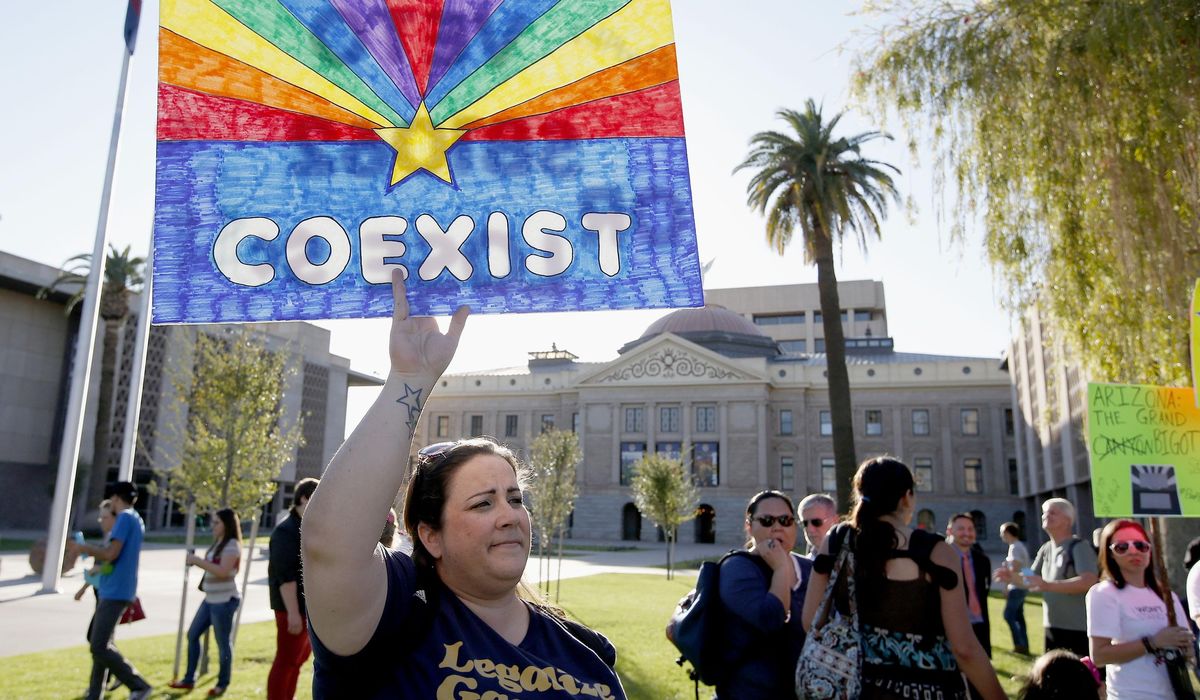
A proposed Arizona bill will require bakers, flower arrangers, photographers and web designers, among other creative professionals, to make available their services regardless of their individual conscience, advocates said Monday.
In addition, licensed counselors will no longer be able to offer so-called “conversion therapy” to minors, regardless of whether the minor or their parents want the intervention. Such a provision, state Rep. Daniel Hernandez, a Democrat, told a Phoenix news conference, “will have an enormous benefit to the LGBTQ youth of the state of Arizona.”
Religious counselors working in a church, synagogue, mosque or other faith-based facilities will not be subject to this provision, backers said.
The bill does not address the hot-button question of transgender athletes in high school or college sports, said Michael Soto, executive director of Equality Arizona, a gay-rights advocacy group. Mr. Soto said questions about athletic competition should be decided “by the governing bodies for schools and athletic associations.”
He said the proposed bill “tells Arizona, every walk of life, that we are working to protect LGBTQ Arizona, together, that’s what’s important. And ensure that businesses are serving everyone, for people of faith, to LGBTQ people, [and] that churches have the freedom within the community to operate.”
The “Equality and Fairness for All Arizonans” bill, to be formally introduced later Monday, is “aimed at updating the state’s non-discrimination law” while offering what critics say are only very limited religious liberty guarantees.
According to attorney Cathi Herrod, president of the Center for Arizona Policy, “The bill does not solve problems, it creates problems. In the guise of fairness and equality, [it] enables the government to go after people who do not subscribe to the government-sanctioned cultural contemporary view of sexuality.”
Ms. Herrod, who said her organization will actively oppose the bill, said the proposed statute “harms businesses by dictating what policies they have to have. It harms parents. It denies freedom to parents, to businesses, to women, and it’s of great concern.”
While some evangelicals have come out against the bill, other religious communities have supported it.
Officials of the Church of Jesus Christ of Latter-day Saints, whose 436,521 members in Arizona comprise roughly 6.2% of the population, said they endorse the measure.
“It is our position that this bipartisan bill preserves the religious rights of individuals and communities of faith while protecting the rights of members of the LGBTQ community, consistent with the principles of fairness for all,” an LDS Church statement said.
Bishop Jennifer A. Reddall of the Episcopal Diocese of Arizona told the news conference, “Just because a business serves a customer doesn’t mean they share or endorse all of that customer’s beliefs. Nobody should have to fear a question when they walk through a door, whether they will be served when they walk through the doors of a business or establishment. We all deserve to be treated with dignity.”
Handicapping this measure’s odds is a perilous task. Ms. Herrod noted that many, if not all, of the measure’s provisions have been proposed — and defeated — in previous legislative sessions. Arizona’s Legislature has Republican majorities in both houses, but at least one Republican lawmaker, Arizona House Speaker Russell W. “Rusty” Bowers, not only favors the bill, but signed on as a cosponsor.
“We’re all different in our own ways, but I hope that we will not put stumbling blocks, but that we will open up opportunity for everybody to grow, that our hearts may have a shape to hold diversity and kindness and understanding,” Mr. Bowers, a veteran legislator, told the news conference.
He was less sanguine about the chances for the measure’s passage, however: “It is extremely tempting to try to chart my path forward, but this [bill] will receive a hearing,” he told a news conference. “I want this to be treated with respect and dignity.”
Along with the Center for Arizona Policy, another advocacy group, Alliance Defending Freedom, signaled its disapproval.
“Every person should be treated with dignity and respect. Unfortunately, laws like the proposal announced today that claim to protect freedom and fairness actually undermine both,” said Greg Baylor, ADF senior counsel.
“If the bill resembles the federal ‘Fairness for All’ proposal, it will harm women, girls, medical professionals, religious individuals and organizations, and many others. It will protect only a favored few and deny freedom to the rest. We can live at peace with each other without forcing anyone to sacrifice their freedom,” he added.
The question of conscience protection for artists and other content creators has been a contentious issue for several years, reaching the Supreme Court in the 2018 Masterpiece Cakeshop case. In that case, baker Jack Phillips declined to create a custom wedding cake for a same-sex couple. In its 7-2 ruling, the high court dodged the central issue, ruling instead that Colorado’s Civil Rights Commission did not employ “religious neutrality” in reviewing Mr. Phillips’ case.
Religious liberty advocates hope the Supreme Court will hear a similar case brought by website designer Lori Smith of 303 Creative, another Denver firm. Ms. Smith says she doesn’t want to be compelled to create messages that violate her conscience.








